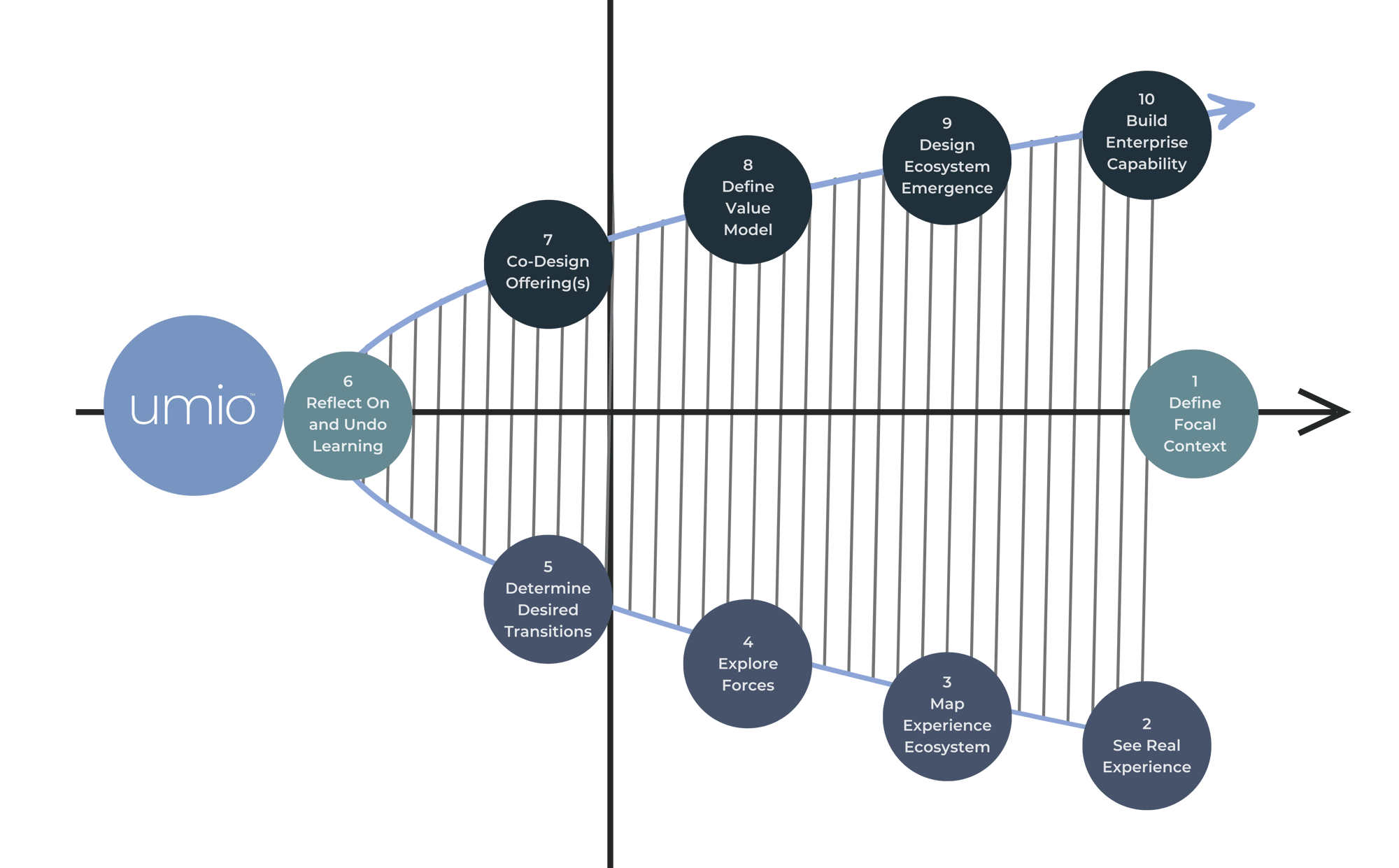Health Ecosystem Value Design 2.0
See, know and act on the wider conditions, forces, inequities and real experience of health, disease and illness
Deploy Umio's breakthrough philosophy, framework and system for creating impacts in focal contexts of whole real experience with health, disease, and other limiting conditions
A new paradigm of health centred on lived experience ecosystems
HEVD 2.0 is a comprehensive framework for understanding and creating health and wellbeing through an ecosystem- and experience-centred approach.
It supports a shift to a more holistic, integrated and processual model of health and its co-creation in experience ecosystems. Here are the key features:
Seven Foundations: Built on seven foundations, each helps to deepen our understanding of the complex forces that form real lived experiences of health conditions.
Core Real Lived Experience Model: HEVD's foundation experience model identifies four domains —bodily-motor, perceptual-cognitive, social-cultural, and material-spatial - that interact to generate and differentiate actual lived experiences with health, disease and illness.
Revealing hidden possibilities for co-creation and impact
Systematic Method: The framework contains a 12-step method with supporting templates and guidelines for enterprises and practitioners to learn, design and act with wider impact in focal experience ecosystems of their choice.
Co-creation Spaces: HEVD 2.0 defines strategic partnering and action spaces for co-creation with traditional and non-traditional health stakeholders. These bear novel opportunities and directions for transitioning experiences on a spectrum from prevention to recovery.
Overall, HEVD 2.0 provides a new paradigm for health creation and health systems, encouraging a more dynamic and interconnected approach to health that can better see and address its origins, differences and recurrence at multiple levels - individuals, families, communities, places and populations - in any context.
HEVD 2.0 Reverse Parabola Learning and Design Process
Sometimes you have to look back ... to go forward

Towards a deeper explanation of the production of dis-ease and health inequities
HEVD 2.0 provides deep insights into complex, health, disease, illness and related phenomena, often cutting across single conditions. By understanding how and why real lived experiences form, differ and persist in a focal context (e.g., diabetes, chronic pain, obesity, isolation, etc.) using an experience ecosystem frame, HEVD 2.0 reveals hitherto hidden patterns and opportunities. This helps enterprises to obtain a powerful new integrated and processual perspective, discover novel possibilities, generate novel ideas, and design novel offerings that power health and wellbeing impacts and co-creation.
“A much-needed paradigm shift in co-creating transformational change toward an enhanced state of all our wellbeing. Outstanding, remarkable and masterful."
Venkat Ramaswamy, Co-creation thought-leader and co-author of The Future of Competition
Who is HEVD 2.0 for?
Care providers, trusts, bodies and institutions
… wishing to improve and adapt care practices, pathways and models in order to address complex disease and illness areas, improve the care experience and accelerate outcomes.National, regional, local governments
... looking to create health and wellbeing, build greater collaboration and convergence around real lived experience, co-ordinate efforts, build more resilient communities and reduce the costs and burdens of disease and illness.Social, patient and community organisations
… wishing to design and execute impactful community and patient programmes, support disadvantaged populations, widen access-to-health, address social determinants and build local and social cultures of health co-creation.Consumer health, pharmaceutical, medical technology companies
Seeking to avoid the “race-to-the-bottom”, widen their market offer, escape the trap of outcome incrementalism, transform their growth profile, discover new sources of value, develop/validate new technologies and make compelling ecosystem-level market access and payer cases.
Academic and research institutions
… wanting to develop new trans-disciplinary silo-busting health and design educational content and programmes, deploy a systemic health research framework, develop and secure grant applications and undertake outreach programmes into local communities as part of applied student and professional learning.Investors, insurers, payers, commissioners
… wanting to assess new technologies, more certainty when making complex investment, risk, policy and purchase decisions and trade-offsStart your journey to real health impact today

Buy the book
Umio founder Chris Lawer's book, Interactional Creation of Health: Experience Ecosystem Ontology, Task and Method introduces our comprehensive framework for understanding and improving health through an experience-centred ecosystem approach. Written during lockdown, Chris proposes a shift from traditional health models to a more integrated and whole view, focusing on the dynamic interactions within various domains of lived or real experience.
"Interactional Creation of Health" aims to provide a new paradigm for health systems, encouraging a more dynamic and interconnected approach to health that can better address the complexities of lived experiences. This framework is designed to be applicable across various contexts, from individual health experiences to broader community and population health initiatives.
.png?width=200&height=68&name=Umio%20lage%20uncropped%20logo%202024%20TM%20(2048%20x%20700%20px).png)